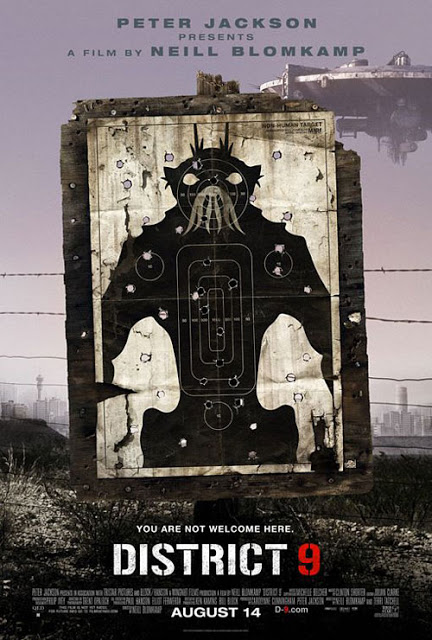Guest post written by Sarah Domet previously appeared at Bitch Flicks on March 5, 2010.
District 9: A Film I Want to Like
District 9, directed by Neill Blomkamp, depicts a futuristic Johannesburg, South Africa, nearly two decades after a massive alien spacecraft grinds to a halt in the sky, hovering silently just above the cityscape. The malnourished, bipedal, crustacean-like aliens, given the derogatory nickname “prawns,” now live in a militarized refugee camp, aptly named District 9 and policed by the South African government. However, crime, weapon trade, and even interspecies prostitution have overrun this filthy alien shantytown, and soon Multi-National United (MNU), a private company, is contracted to relocate the prawns to a more easily patrolled area, one much farther from the city limits. Enter Wikus van der Merwe (Sharlto Copley), a middle-management Yes-Man put in charge by MNU head (coincidentally, also his father-in-law) to lead the evacuation and relocation of these creatures. (His primary job is, hilariously, to go door-to-door, politely asking the prawns to sign an eviction notice while MNU mercenaries with machine guns look on. How bureaucratic!)
[…]
Science fiction is often a useful allegorical genre that allows filmmakers to discuss socially and politically charged issues in a way that is palatable to average moviegoer. Take Minority Report, for example, or The Matrix, or the film-adaptation of Orwell’s novel 1984. District 9 attempts to borrow from this rich tradition, and it’s nearly impossible to critique this film without pointing to the overt, sometimes too obvious, racial commentary that serves as the backbone of the plot. District 9 is, after all, set in South Africa, the geographical epicenter of Apartheid. However, to the Bitch Flicker who turns to this movie looking for deep political or social commentary, I say this: Don’t waste too much time looking. While the film seems to want to reveal a reverse racism, one where the historical victims (South Africans) become the villains, propagating against the prawns the same violent and discriminatory acts that were once committed upon their own people, in the end the movie either: a.) substitutes gunfire, gore, or special effects at any moment the movie veers too far from the surface, b.) relegates Big Ideas to Small Peanuts by reducing the plight of the prawns to the pursuit of Wikus’s happiness, or c.) reinforces the very racist notions that it wishes to resist (see representation of Nigerian gangsters.)
Wikus’s wife, who is given no real identity, save the fact that she is torn between the age-old allegiance to her father and loyalty to her husband (implying that she most certainly “belongs” to one or the other), won’t relinquish hope of her husband’s return by the film’s conclusion. Someone is leaving strange gifts on her doorstep, gifts oddly similar to the ones dear hubby Wikus used to give her. Blomkamp insinuates that she’s a steadfast wife who will do her wifely duty and wait faithfully for her disappeared husband. The viewer is given no back-story or insights into their relationship; yet, forced upon us is the heavy-handed notion that they really do love each other—like, in that super-deep, eternal-love kind of way. Their story, of course, is a bottom-tiered thread in the narrative.
Sarah Domet received her Ph.D. in English Literature and Creative Writing (Fiction) from the University of Cincinnati in 2009. She spends most her time writing, teaching, cooking, gardening, taking long drives in the country, and doing other things that would lead you to believe she’s 80 years old. Look for her book, (F+W Publications, 2010).


1 thought on “Women in Science Fiction Week: ‘District 9’ and Absent Feminism”
Comments are closed.